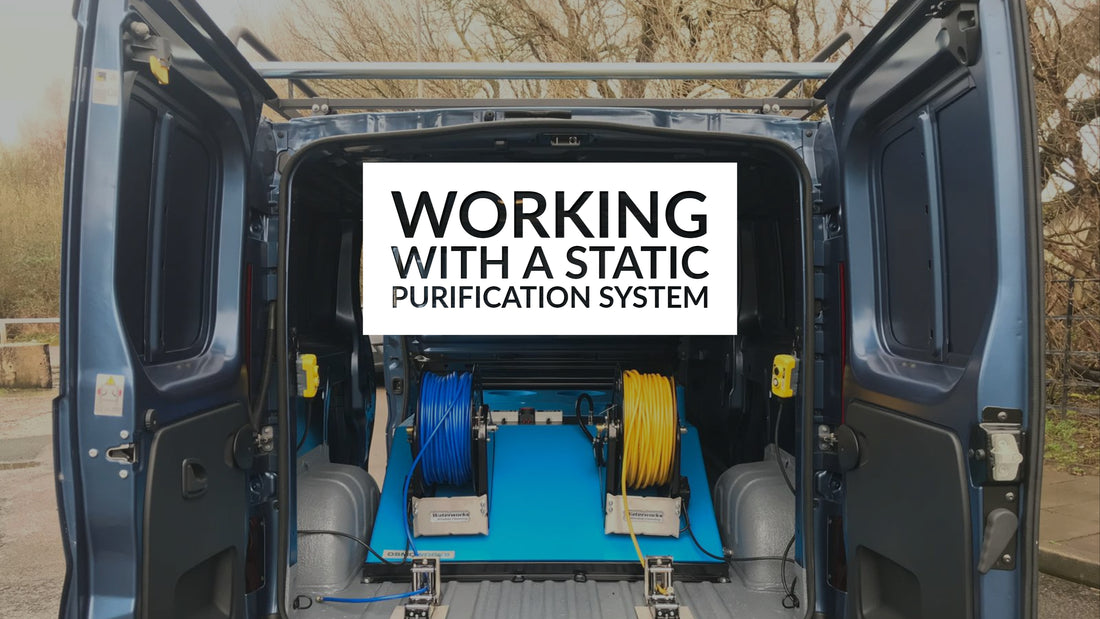(Read Time: 3 minutes)
Here by mistake? click here to go back to the complete guide to pure water cleaning
To work with a static purification system, there are a few components that are necessary to facilitate the delivery of this water into a workable Window Cleaning system. The scope of this article is to lend a hand to Window Cleaners unsure how exactly you use a static purification system on a day to day basis, and highlight additional equipment that is necessary.
Let’s first split the process into two steps. The first is purifying water ready to clean with, and the second is delivering the water from your purification system to the Windows.
Purifying The Water
The first item on the list is of course, a water purification system, there are a few choices but at this point, I’m going to assume you have an idea of which might suit (if not, use our complete guide to pure water systems HERE).
Once you’ve decided on the purification method, you next need to consider how you’re going to store the purified water. The simplest method is to use a holding tank, this can be anything from a few hundred to a few thousand litres (see tank selection HERE).
Most static RO/DI Systems will arrive configured, for the most part. You simply need to connect the system to a standard garden Hozelock style tap, flush the membrane (instructions should be provided to help with this) and then coming out of the other end will be pure water. When purchasing your RO/DI system you will need to consider how far your holding tank will be from the system. You may need to purchase additional hose and couplings to run hoses from the system to your holding tank.
Some RO/DI Systems come ready fitted with auto-shut off kits to stop water production when the holding tank is full, these can be particularly convenient if you’re producing large volumes of water as you aren’t required to stand guarding the system to ensure it doesn’t overflow. The other item to consider would be an inline TDS Meter, to check the purify of water leaving the system, it’s worth doing this prior to any fill as a tank full of partly-pure water isn’t of use to anyone.
Delivering The Water
So you’ve managed to store water from your static purification system, now what?
Next is deciding on how you’re going to actually facilitate your day to day cleaning. This could be with a small backpack or trolley system, or a vehicle mounted system – both of which will be very simple to use and maintain as there’s no need for on-board filtration.
You will notice a number of Window Cleaning Systems on our website marked as ‘delivery systems’, this simply means there is no filtration included. Some Window Cleaners choose to have a DI filtration vessel fitted to their delivery system – as a fail safe of sorts. That way, if your tank water is ever contaminated, you can use this as to purify water on the go quickly. However this of course isn’t necessary.
In terms of choosing equipment, there are positives and benefits to each. Whilst a backpack or trolley gives you portability, either will mean you regularly have to revisit your holding tank to refill (or carry water canisters). Alternatively, you can get a much larger capacity vehicle mounted system but this will need to be bolted into your vehicle on a permanent basis.
Transferring water from your holding tank may require a few additional items. Most holding tanks will come with an outlet on the bottom. The simplest way is to let gravity do its work and use this outlet (with some hose) to fill your delivery system with the freshly purified water. Alternatively, a much more convenient way to fill is by using a submersible pump. these pumps will allow you to fill any size of system in a matter of minutes, when used with 1” transfer hose (see our checklist below for examples of each item).
Which delivery system best suits is beyond the scope of this article, many choose to use a van mounted system, other opt for portable solutions, ultimately that is a decision you’ll need to make based on your workflow and pure water requirements – alternatively you can contact us and we can try to provide a little assistance & advice.
Below are links to two of our best selling delivery systems:
—> FaceLift 70 Litre Trojan Trolley – Portable Delivery System
—> FaceLift 325 Litre Compact – Van Mounted Delivery System
What To Do Now?
Unsure which static RO/DI System to go with, use our guide below!
—> Choosing a Static Purification System
—> Go Back To The Complete Guide To Pure Water Systems
Static Purification Checklist
Use the checklist below to ensure you have everything required to facilitate Pure Water cleaning:

